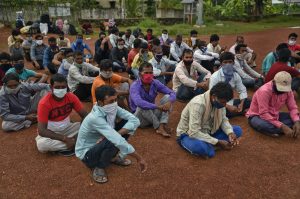The COVID-19 crisis has not only made millions of India’s migrants visible — it has also exposed the apathy of political leaders across the country toward the most vulnerable. India’s COVID-19 cases have skyrocketed to over 1.1 million, trailing behind just Brazil and the United States. The abrupt lockdown imposed by Indian Prime Minister Narendra Modi, giving 1.3 billion people just four hours to prepare, has devastated India’s fledgling economy and created the largest migrant exodus India has seen since partition in 1947.
For much of the crisis, the central government abdicated responsibility for the transport of refugees to state governments after suddenly announcing a nationwide lockdown. This resulted in tens of thousands of impoverished migrants cycling, walking, and hitchhiking to their villages – often without any food. According to one database, at least 209 people died due during the post-lockdown migration and 167 have died of starvation and financial distress imposed by the lockdown.
The electoral disenfranchisement of migrants could explain the political indifference toward them. All citizens of India are guaranteed the “right to vote” by Article 326 of the Indian Constitution and the 1951 Representation of the People Act. However, a study across five Indian states by Aajeevika Bureau found that 60 percent of the migrants it surveyed had missed voting in elections at least once because they were away from home seeking work. The study also found that migrants were much more likely to vote in the local Panchayat elections, as there is special effort by the candidates to bring them home for the tightly fought polls, but participation drops significantly for national-level Lok Sabha and Rajya Sabha elections.
This is reflected in the voter turnouts of Bihar and Uttar Pradesh (UP) in the last elections. While the national voter turnout was 67.4 percent, two of the biggest net migrant sender states, Bihar and UP, had the lowest voter turnout rates in the 2019 Lok Sabha Elections at 57.3 percent and 59.2 percent, respectively.
While the Electoral Commission of India (ECI) allows migrants to shift their electoral registration from one constituency to another, many do not. This could be because, according to one estimate, nearly 100 million are cyclical/seasonal workers. Another major factor limiting the migrants’ ability to enroll in their city of employment is the lack of residential proof. A recent survey by Tariq Thachil found that 52 percent of the migrant laborers surveyed lived in cramped and usually illegally rented rooms and 25 percent slept on footpaths.
Many see the upcoming elections as a mandate on central and state governments and their handling of the crisis, but can it be a mandate if those most affected are not heard? According to the 2011 Census of India, nearly 37 percent of Indians, around 450 million people, are internal migrants. Internal migration in India had increased by 45 percent between 2001 and 2011. As migrants start pouring back into cities driven by their economic needs and the lifting of the lockdown in some places, their voices may be left out once again.
As the Bihar Assembly elections near, there is increasing impetus to understand who gets to vote and how voting will be implemented during this crisis. Absentee ballots are one way to ensure that no vote is left behind.
Studies have shown that increased accessibility to voting through postal ballots increases voter participation. Past research by Simon Luechinger, Myra Rosinger, and Alois Stutzerhas found that the availability of postal voting could increase voter turnout in Switzerland in a sizable and statistically significant manner by 3-4 percent.
India already allows absentee voting but only to some of its citizens. Citizens above 80 years of age, members of the Indian armed forces, members of the armed police force who are serving outside their state, and people employed by the government of India serving a post outside the country can vote through some form of absentee voting including postal ballots, proxy voting, or the Electronically Transmitted Postal Ballot System (ETPBS).
Earlier this month, the ECI announced the extension of postal ballots to senior citizens over 65, disabled citizens, and “COVID 19 suspect or affected persons” in the Bihar elections, stating that these people may be at a higher risk of contracting or spreading the coronavirus. However, the ECI has since rescinded this provision, citing logistical challenges.
Moreover, in other parts of India, like Gujarat, voters were also able vote online in local elections in Ahmedabad, Surat, Vadodara, Rajkot, Bhavnagar, and Jamnagar in 2010, 2011, and 2015. Nevertheless, this year, bucking the global trend of making voting more accessible during the COVID-19 crisis, the Gujarat State Election Commission (SEC) has decided to discontinue the e-voting option for this year’s elections in November. Gujarat has the fifth highest number of coronavirus cases in the country.
In 2018, the ruling Bharatiya Janata Party (BJP) also proposed a bill to grant “proxy voting” rights to overseas citizens. While the bill passed the Lok Sabha, it remains stuck in the Rajya Sabha. No such voting provisions have been made for migrant workers.
It is not enough to simply grant migrant the right to vote without providing the infrastructure to exercise that right.

































